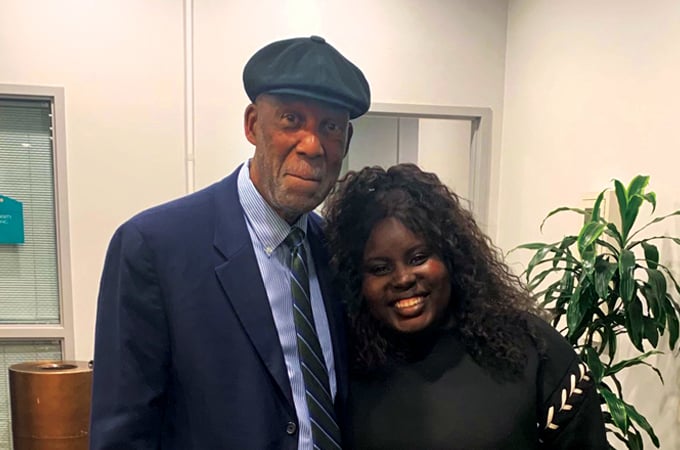About 60 University of Redlands students and other community members recently gathered to hear “Lessons from Little Rock,” a talk about one man’s experience as a black youth after the Supreme Court ruled on Brown vs. Board of Education in favor of desegregating schools across the nation.
Today, Terrence Roberts is the CEO of Terrence Roberts Consulting, a management consultant firm dedicated to fair practices in business and industry, but in 1957, Roberts was one of nine black students—subsequently named the “Little Rock Nine”—to first attend the formerly segregated Central High School in Little Rock, Arkansas.
Roberts recalls that the U.S. Army, under orders from President Dwight D. Eisenhower, came to keep peace and ended up staying the entire school year. However, the soldiers were not allowed to do much more than escort them to class, he said, adding, “None of the soldiers had ammunition because they might become provoked and shoot somebody.”
Inside the school, the nine bore the brunt of violent, racially charged actions from white students. Roberts was the only black kid in his physical education class of 60 students, and once, after taking a shower, someone threw a combination lock at him. “I’m naked, wet, bleeding,” he said. Another time, he opened his locker to put on his clothes, but someone had filled it with water using the air vent: “All of my clothes were soaking.”
Another member of the Little Rock Nine, Minnijean Brown—later a civil rights activist who worked for the Clinton administration in the Department of the Interior—was also bullied. Roberts recalls that once Brown “had a lunch tray and some kid pushed his chair back to impede her progress.” She encountered so much trouble, Roberts explained, that she finally “gave up nonviolence and began beating up white kids … Because [Minnijean] was [considered] violent, she was kicked out of the school.” Despite the fact that black students were not granted the same privileges as white students, the remaining eight retained their commitment to nonviolence.
In 1959, Roberts relocated with his family to California, completing his senior year at Los Angeles High School. He later graduated with a bachelor’s degree in sociology from California State University, Los Angeles (UCLA), a master's degree in social welfare from UCLA, and a Ph.D. in psychology from Southern Illinois University, Carbondale. In 2009, Roberts published a memoir, Lessons From Little Rock (Butler Center for Arkansas Studies).
Being one of the Little Rock Nine didn’t feel very significant after he moved to California, Roberts says, especially since the opposition to desegregation in his home town continued. Later in life, however, many white students who bullied the Little Rock Nine reached out to make amends with Roberts and the rest of the group. “They told us that their parents were racist ideology devotees,” he said, “and by default, so were they.”
At the end of his talk, Roberts reminded everyone “It is important that you don’t rely on the notions that other people have about you.”
Many students at the event appreciated hearing about Roberts’ experiences. David Kobylka ’20, for one, said he hadn’t heard much about the Little Rock Nine before, and “It was nice to hear it from Roberts himself.”
Learn more about student affairs and programs of study at the University of Redlands.






